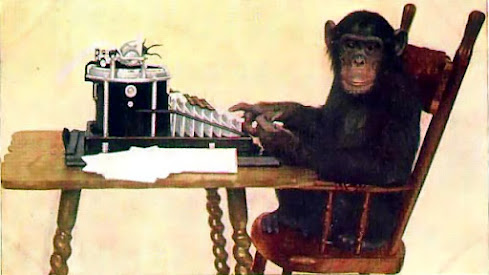In a response to this post by Francis Berger, the commenter Tom uses an analogy which I found quite thought-provoking. He writes:
"What if Shakespeare had invented the English language? No one would have understood anything he wrote, that's what. It could be explained in the contex of another language, by taking the persistent elements of that language to explain Shakespeare's new one. Without that context it would be unintelligible nonesense, and arguably not creative at all.
...
The genius of Shakespeare is not that he invented the English language, but that he understood so well the pre-existing tools he had to work with that he was able to assemble them in brilliant new ways. So even the combinations no one had heard before his plays, like upstairs, were immediately intelligible."
In what sense was Shakespeare creative? In theory his plays are just arrangements of letters, spacing, and punctuation. This has led to the famous thought-experiment that the text of the plays could be produced by a sufficiently large number of monkeys typing for a sufficient length of time.
And besides the text, what about the English language itself? Is it true that once the rules of the English language and the given words have been set up then speaking and writing are just picking combinations out of this vast universe of possibilities?
In terms of speaking and writing, this has been satisfactorily explained by pointing out that when humans make words and sentences, they are choosing to combine letters to communicate meaning. The meaning is what distinguishes any particular choice of speaking or writing from a random choice out of a universe of possibilities. This is because, from the perspective of randomly generated text or speech, meaning doesn't come into it. Even the fact that the words are in English is unimportant when considered purely in terms of permutatination of letters, spaces, and punctuation. It may as well be permutations of pebbles.
But when we go to bigger topics, we have to even go beyond that. I believe that the model of possibility as actualizing a universe of possibilities that are already "there" is unsatisfactory when coming to terms with creation and free will. (And this is true whether creation and free will are considered according to the traditional understanding or according to the pluralist understanding).
For instance, Leibniz famously believed that God chose to actualize the best of all possible worlds. But the key word here is "possible". When we think of possible worlds in practice we think of our world but modified in various ways, great or small. But what does possible world mean before any worlds are created?
Or in terms of free will, choices are sometimes conceived in terms of actualizing prior possibilities. But then this leads us to strange scenarios like the idea that whenever someone makes a choice, the universe splits and all the choices that weren't made happen in some other universe. And this comes from the idea that those choices are already "there" before they were made. While it is true that our actions are already constrained because the world is not made by us, I think there's still something more there.
Or also, the idea of the Great Chain of Being as something like a probability distribution of beings where God chooses which beings to actualize and which to leave uncreated. But then that leaves us in a strange situation: where are these uncreated beings? In fact, if God does create beings from nothing and it really is nothing, not even His thoughts (if such a thing be possible), then that might be one way that free will comes to exist.
In pluralist metaphysics, we are faced with the same issue. There are an indefinite number of beings, each unique. (On a side note, I will say that the base assumption of pluralism does not specify the characteristics of these beings; there may be many different genera that they fall into). But then what governs the characteristics of these beings - is it some sort of prior distribution of being or are all possibilities (whatever that would mean) expressed? I don't think either of those are satisfactory either.
The nature of possibility is something that human beings will never fully comprehend, but I believe that it is still worth thinking about. In order to understand creation and free will at a more fundamental level, we need a better understanding of possibility and in particular, we need to understand what it means for something to be truly new, not just selected from a universe of predetermined possibilities.

